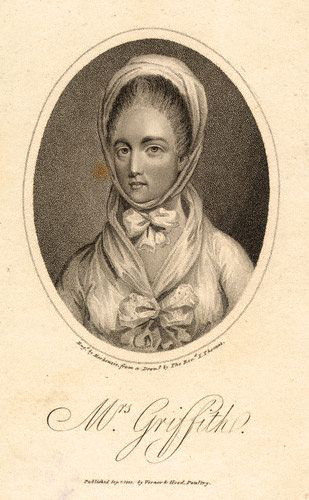Elizabeth Griffith was born in Wales in 1727 but raised in Dublin, where – at the age of 22 – she made her acting debut on the Smock Alley stage. In 1751, she secretly married Richard Griffith (no relation), a Kilkenny gentleman who had no money despite coming from an aristocratic family. With her husband, she had two children, Richard and Catherine. In an effort to improve her family’s shaky financial situation, Elizabeth moved to London alone in 1752, where she acted at Covent Garden but only ever landed minor roles. Out of financial necessity, she decided to become a writer, and she first gained fame for A Series of Genuine Letters Between Henry and Frances (published in six volumes between 1757 and 1770), which was co-written with her husband and based on their actual romantic correspondence.
Between 1759 and 1764, Griffith and her family resided back in Ireland (in Dublin and Portarlington), but their financial situation remained extremely perilous. Thus, the family moved to London where she soon established herself as an important playwright of the day. Her breakthrough play, The Platonic Wife (1765), is similar to much of her work in that it simultaneously challenges and conforms to late eighteenth-century views on gender. In that play, the eponymous wife, Lady Frankland, leaves her husband, because he is not “emotionally available” to her (as we would put it today); audiences at the time were shocked at the idea of a wife having expectations of her husband – and not simply accepting whatever behaviour he decided to mete out to her. Griffith also commented on gender issues in the play by showing how unsafe the world was for “unattached” females, since Lady Frankland (being separated from her husband) and her close friend Emilia (a single woman who has moved to London from her parents' home in Wales) are at the mercy of predatory and circling rogues, bounders, and creeps – characters who, as men, hold all the cards power-wise. That said, at the end of the play, Lady Frankland does seek shelter under her husband again; Emilia marries one of the dodgy (if slightly more honourable) males; and Griffith arguably reinforces certain fixed ideas around gender. Regardless of this backing down from thorough proto-feminism, Griffith is to be praised for raising issues around female emancipation in The Platonic Wife and, in fact, all of her plays.
Incidentally, Griffith’s son became rich working for the East India Company, and Elizabeth and her husband eventually moved back to Ireland, settling down in material comfort on their son’s estate in Co. Kildare.
Plays
- The Platonic Wife (1765)
- The Double Mistake (1766)
- The School for Rakes (1769)
- A Wife in the Right (1772)
- The Times (1779)
Find out more
For more on this playwright from an Irish Studies perspective, see the chapter on Griffith in my book Irish Anglican Literature and Drama: Hybridity and Discord (2021). For more information on Griffith – and to read the original, "uncut" version of The Platonic Wife (1765), in which the Irish character Patrick has an even bigger and more heroic role – visit David O'Shaughnessy's The Censorship of British Theatre, 1737-1843 online database.

